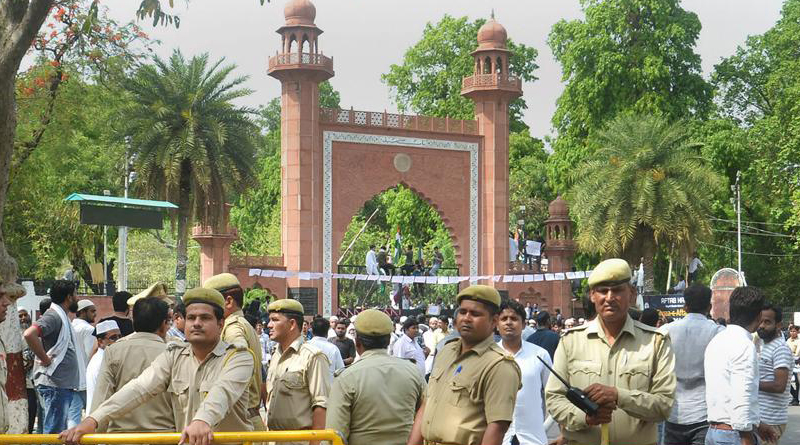The attack on May 2 by the Hindu Yuva Vahini on Aligarh Muslim University — for having a photo of Mohammed Ali Jinnah in the students’ union hall — has provoked much debate in the wrong direction. The core issue is not whether Jinnah was horrible or acceptable, but whether any person can violently force an institution to take down a portrait he dislikes.
Forget the merits and demerits of the Jinnah portrait. Whatever your view on that, it cannot override the right of every citizen to display any portrait he likes in his institution or home. You may agree or disagree with that citizen, but his action is completely legal.
I regard Lenin, Stalin and Mao as terrible mass murderers, deserving the utmost condemnation. Does that entitle me to assault the offices of any communist party and demand that it take down the portraits of these killers? Not at all. I have the right to protest peacefully, but not to use violence. The issue is not whether Stalin or Mao were terrible or acceptable, but whether I am honouring the civil rights of my fellow citizens.
I think Indira Gandhi was a dreadful person who imposed an undemocratic Emergency on India. I also view Veer Savarkar as a terrible person who preached a Hindutva vision of India that is very divisive and violenceprovoking. Does that entitle me to assault any Congress or BJP office and demand that portraits of these people be taken down? Not at all. The main point here again is not the merits or demerits of Indira Gandhi and Savarkar, but my obligations as a law-abiding citizen.
It is entirely legal to put up any portrait you like. By contrast, it is clearly illegal to physically attack an institution and beat up its members. The key issue is not Jinnah’s portrait, but whether the state government will take strong action against the goonda brigade, or let off the thugs with a slap on the wrist and a smile.
After the attack, students of AMU marched to the police station to lodge an FIR and demand the arrest of the culprits. The police lathicharged the students, of whom 28 were taken to the hospital with injuries. Sadly, the police appeared to side more with the attackers than those who were attacked. Two Hindutva activists were indeed arrested, and that is a good thing. But there has been no follow-up action against others, so the danger remains that those arrested will eventually be seen as patriotic BJP heroes rather than criminals.
AMU students are still on protest, demanding action against the attackers and a judicial inquiry. The top priority of the AMU authorities and local administration is, quite rightly, to calm tempers. The student agitation has remained peaceful but determined. Almost one-third of AMU students are Hindus, many of whom have joined the agitation. They should refuse at this point to even discuss the desirability of keeping Jinnah’s portrait — they should focus on the core issue of thuggery alone.
Columnist Aakar Patel has argued that Partition was caused less by Jinnah than by Congress unwillingness to share power with the Muslim League through a separate list of Muslim seats reserved for Muslim voters. Another columnist, Ajay Kumar, says Jinnah was a bona fide Independence movement leader, who successfully defended Bal Gangadhar Tilak in court. Kumar adds that Jinnah’s portrait hangs along with those of Gandhiji and Ambedkar in the Bombay High Court Museum, which was inaugurated by none other than Narendra Modi, without incident.
Social media is full of BJP voices blasting Jinnah. BJP president Amit Shah has castigated Congress leader Mani Shankar Aiyar for calling Jinnah “Qaid-e-Azam”. Mani has responded by providing a lengthy list of occasions on which Gandhiji referred to Jinnah as Qaid-e-Azam, and a list of Gandhiji’s letters to Jinnah starting “Dear Qaide-Azam.” Did this cause anybody to call Gandhiji antinational? No, political discourse was civil those days, even among political and ideological foes.
All this makes for an interesting debate. Yet it also tends to divert attention from the fundamental point that goondas must speedily be prosecuted and convicted, even if they are affiliated with one party or another.
The BJP is not alone in using goons. Other parties have used goons too. But as the ruling party in Delhi and Lucknow, the BJP has a special responsibility. Modi could never have come to power on the basis of Hindutva alone. He promised good governance, the very opposite of thuggery. The more he is seen as a godfather of thuggery, the faster he will lose his Midas touch.


